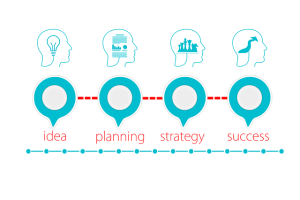What is IP Targeting and How Does It Work?
IP targeting is one of the most important tools you have to reach your target customers. But what is IP advertising, and how does it work in a digital marketing plan?
Household IP targeting is the process of identifying and targeting a specific group of people with your advertising based on their Internet Protocol (IP) address. An IP address is a unique identifier assigned to every device connected to the internet.
When you visit a website, the site’s server records your computer’s IP address. This information can be used by advertisers to target ads specifically to users who have visited their site. IP targeting is one of the most effective and efficient ways to ensure your ads reach the people you want them to reach.
What is IP Targeting?
How does IP targeting work? When a user visits a website with IP targeting, their IP address is collected by the website’s server and passed on to advertisers who target that site’s visitors.
Advertisers can then use this information to display ads only on websites they know will be seen by people interested in their product or service. This allows advertisers to put their best foot forward for each visitor and show each person only the ads they’re most likely to respond positively to.
Each computer has its own unique IP address which remains unchanged as long as the machine is connected to the internet, so it’s possible to determine whether someone has previously visited a website using only their IP address.
This allows advertisers to target ads at users who have already shown interest in the product or service, increasing the likelihood that people will click on those ads and buy whatever it is you’re selling.
 IP Targeting vs. Cookie Tracking
IP Targeting vs. Cookie Tracking
Cookie tracking is another popular method of digital marketing and advertising which functions very similarly to IP targeting. When a user visits a site with cookies enabled, they automatically download tiny “cookies” onto their device which track basic information about them, such as how many times they’ve visited that site or what items they have searched for on the page.
Advertisers can then use this information to display IP targeting Google ads or IP address targeting Facebook ads on other websites based on products or services the user has shown an interest in.
The major difference between IP targeting and cookie tracking is that cookies are created on the user’s own machine, while IP targeting relies on the website itself to make note of users’ IP addresses.
This means that it’s not possible to target people who have visited a site without an advanced tool like Adobe Target since their IP addresses are never directly recorded. Cookies can also be turned off by users, which makes them less reliable than IP targeting when it comes to accurately identifying your consumers.
 IP Targeting Advantages
IP Targeting Advantages
There are several benefits to using IP targeting in digital marketing campaigns over other methods such as cookie tracking:
More accurate results
Since you can only track people whose browsers accept third-party cookies (most of them), there’s a good chance that many of your target customers will be missed. Cookies can also be turned off by users, further decreasing the accuracy of your reach. IP targeting allows you to pinpoint specific people using their unique IP address and reach them on all devices from which they access the internet, making it easier to reach the right audience every time.
Better value for money
To maintain high levels of accuracy when tracking individuals with cookies, advertisers have to purchase expensive third-party data or rely on common demographic information such as age, location, and gender which isn’t always relevant to their product or service. This means that ads targeted at certain demographics might not match what you’re selling lowering conversion rates and wasting money. With IP targeting, there’s less chance of having to rely on third-party data or spending money on ads that won’t convert since you can target by specific people.
More flexibility
Since IP targeting only requires the advertiser to have a list of websites they want their ads to appear on, it opens up a lot more options for budget optimization. Advertisers who use cookie tracking are limited by which sites will accept their cookies and what information these sites record about their visitors since it’s possible for users to turn off all cookies in their browser settings. This means advertisers using IP targeting don’t need access to advanced tools at all times – instead, they can simply pay for traffic from an individual website that offers IP ad targeting.
IP Targeting is a great way to increase your ROI on digital marketing campaigns by targeting consumers who have already shown interest in the product or service. It also provides more accurate results, better value for money, and flexibility than other methods of advertising such as cookie tracking.
If you want to learn more about what is IP marketing and how it can help you grow your business online, reach out today! Our team of experts is ready and waiting to assist you so that we can create an effective digital marketing plan with you.
RLS Group is a full-service advertising and digital marketing agency in Jacksonville Florida and offers public relations, web, and social media and video.



